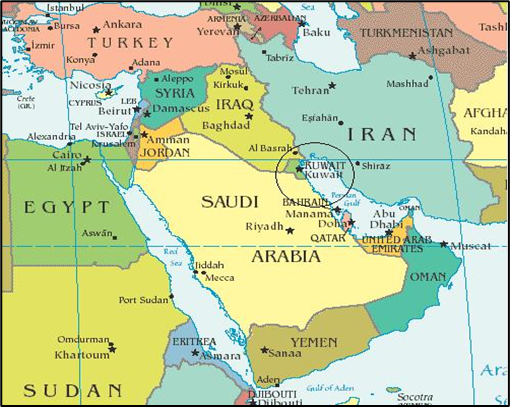Why in News?
Prime Minister Narendra Modi's recent visit to Kuwait marked a historic milestone in bilateral relations, as the two nations elevated their partnership to a “strategic” level.
This significant development underscores enhanced cooperation in trade, defence, etc., and India’s growing role in the Gulf region amidst evolving geopolitical dynamics.
What’s in Today’s Article?
- A Brief About India-Kuwait Ties
- Historic Significance of the PM’s Recent Visit to Kuwait
- Implications of the PM Modi’s Recent Visit on the India-Kuwait Ties
- Conclusion
A Brief About India-Kuwait Ties:

- Background:
- India and Kuwait enjoy traditionally friendly relations, which are rooted in history and have stood the test of time.
- India was one of the first countries to establish diplomatic relations with Kuwait following its independence from British Protectorate in 1961.
- India has been a natural trading partner of Kuwait and until 1961, Indian Rupee was a legal tender in Kuwait.
- Current dynamics:
- Kuwait is India’s sixth-largest crude oil supplier, meeting 3% of its energy needs.
- Indian exports to Kuwait surpassed $2 billion for the first time. Kuwait Investment Authority’s investments in India exceeded $10 billion.
- The Indian community is Kuwait’s largest expatriate group, significantly contributing to the Gulf nation's economy and development.
Historic Significance of the PM’s Recent Visit to Kuwait:
- First visit in 43 years: Modi’s two-day visit was the first by an Indian Prime Minister since Indira Gandhi’s visit in 1981.
- Recognition of leadership: Kuwait honoured Modi with its highest civilian award, ‘The Order of Mubarak Al-Kabeer,’ acknowledging his contribution to strengthening India-Kuwait ties.
- Engagement with Kuwaiti leadership: Modi met with:
- Amir Sheikh Meshal Al-Ahmad Al-Jaber Al-Sabah (first bilateral meeting).
- Crown Prince Sheikh Sabah Al-Khaled Al-Hamad Al-Mubarak Al-Sabah.
- Prime Minister Sheikh Ahmad Abdullah Al-Ahmad Al-Sabah.
- Strengthening bilateral relations:
- Defence cooperation: A comprehensive defence agreement was signed, covering areas like:
- Training and exchange of personnel.
- Joint military exercises.
- Supply and research in defence technology.
- Trade and economic ties:
- Kuwait is one of India’s top trading partners, with bilateral trade valued at $10.47 billion (2023-24).
- Modi invited the Kuwaiti Investment Authority to explore opportunities in energy, pharma, food parks, and infrastructure in India.
- Additional agreements: Three MoUs were signed in areas of Sports, Culture, and Solar energy.
- Expanding strategic cooperation: The elevation to a strategic partnership aims to deepen collaboration in sectors like:
- Pharmaceuticals
- IT and FinTech
- Infrastructure
- Security
- Vision 2035 alignment:
- Modi congratulated Kuwait on its developmental initiatives under ‘Vision 2035.’
- Both leaders expressed mutual commitment to achieving shared goals through increased cooperation.
Implications of the PM Modi’s Recent Visit on the India-Kuwait Ties:
- People-to-people connections: Acknowledgment of the 1 million-strong Indian community in Kuwait, appreciated for their contributions to the Gulf nation’s development.
- Regional and global implications:
- Collaboration with GCC:
- India expressed interest in intensifying cooperation with the Gulf Cooperation Council (GCC), leveraging Kuwait’s presidency.
- Focus on concluding the India-GCC Free Trade Agreement to boost trade volumes, which reached $184.46 billion (2022-23).
- Shared vision for West Asia:
- Discussion on ensuring peace, stability, and prosperity in the volatile West Asia region.
- Joint condemnation of terrorism and commitment to dismantling terror networks.
Conclusion:
- Modi’s visit has set the stage for a more dynamic and robust India-Kuwait partnership.
- With enhanced defence ties, expanded trade, and strategic alignment, this renewed relationship promises significant benefits for both nations and the broader Gulf region.









